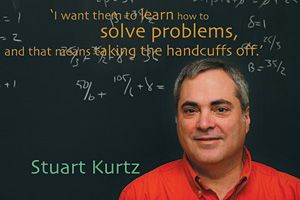Stuart Kurtz, Professor in Computer Science and the College
By Steve Koppesskoppes@uchicago.edu
News Office
 Photo by Beth Rooney Stuart Kurtz |
|
When Computer Science Department Chairman Stuart Kurtz saw that he had received a letter about the Quantrell Awards for Excellence in Undergraduate Teaching, he assumed that one of his colleagues had earned the award.
After all, departmental colleague Janos Simon received a Quantrell last year, as did Laszlo Babai in 2005. But after Kurtz, Professor in Computer Science and the Physical Sciences Collegiate Division, read the letter for a third time, he realized that this time the award was going to him.
Kurtz became keenly aware of the Quantrell Awards’ significance almost as soon as he arrived on campus in 1981, he said. “It excited my imagination very early on.”
Kurtz hales from a distinguished pedigree of teachers, including Michigan State University mathematics professor Edward Ingraham. The five classes Kurtz took from Ingraham comprised “an absolutely wonderful abstract algebra sequence,” he said.
“It was a matter of considerable pride for him that no student had ever gotten a hundred percent on one of his exams,” Kurtz said. “I came close. I managed to drop a minus sign in a calculation and ended up with a 99.5 on the last test I took from him.”
Far more significant to Kurtz than that test outcome, though, was Ingraham’s love of teaching, the joy he derived from his instructional material and his interest in students outside the classroom.
“He was interested in us as people, would talk to us, advise us, was curious about what we were thinking, where we were headed,” Kurtz said.
After earning his Ph.D. in mathematics from the University of Illinois, Kurtz joined the Chicago faculty in 1981 as a Dickson Instructor. Two years later, he helped found the Computer Science Department.
“The point I made at the time is you can study the mathematics of computation in the math department or a computer science department, but the computer science department has nicer toys,” he joked.
Kurtz taught two undergraduate courses this year: the first-quarter programming course, and the second-quarter honors programming course. He likens his teaching style to the personality of professional football television commentator John Madden: “a lot of enthusiasm and jumping up and down.”
His students provide the spark. “I enjoy the undergraduates that we have. They’re smart, they work hard, they ask great questions,” he said. The students in the honors course especially like to be pushed, given difficult material and assigned open-ended projects.
“I like it best when students are pushing me as hard as I’m pushing them, and that happens a lot,” Kurtz said.
For the last three years, his honors course has included a wiki, where students suggest projects and work on them together. “It becomes this great collaborative free-for-all,” Kurtz said.
At the end of the quarter, the students give presentations on their projects, often in teams and on problems of their own invention. Kurtz provides the students an array of programming languages to work with, but opens the door to use other tools if they so desire.
“I want them to learn how to solve problems, and that means taking the handcuffs off,” he said.
The students would probably chafe at any such restraints, anyway.
“They don’t come expecting to be taught a half dozen recipes that somehow by rote application will get them through all of the problems they expect to encounter in life. They really want understanding at a deeper level.”
That attitude should serve them well in a discipline subject to rapid technological change. “Computer science as a discipline that rewards people who continue to invest in themselves and punishes people who don’t,” Kurtz said.
![[Chronicle]](/images/sidebar_header_oct06.gif)